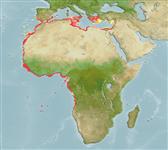Environment: milieu / climate zone / depth range / distribution range
Sinh thái học
Biển; Thuộc về nước lợ gần đáy; Ở đại duơng, biển (Ref. 51243); Mức độ sâu 20 - 200 m (Ref. 3589). Subtropical; 39°N - 16°S, 17°W - 60°E (Ref. 54435)
Eastern Atlantic: along the west coast of Africa to southern Angola (Ref. 5222, 57293), including the southern Mediterranean (Ref. 5222). First record from Corsica, France in 2012 (Ref. 95840). Records from the Canary Islands and Cape Verde are unsubstantiated (Ref. 5222).
Length at first maturity / Bộ gần gũi / Khối lượng (Trọng lượng) / Age
Maturity: Lm 55.0, range 50 - 60 cm
Max length : 120 cm TL con đực/không giới tính; (Ref. 5222); common length : 60.0 cm TL con đực/không giới tính; (Ref. 26999); Khối lượng cực đại được công bố: 25.0 kg (Ref. 5222)
Các tia vây lưng cứng (tổng cộng) : 10 - 11; Các vây lưng mềm (tổng cộng) : 14 - 16; Tia cứng vây hậu môn: 3; Tia mềm vây hậu môn: 7 - 9. Diagnosis: depth of body less than head length, depth 3.0-3.6 times in SL; head length 2.5-2.9 times in SL; interorbital area convex; preopercle angular, 3.6- large spines at the angle, lowermost directed ventrally; posterior nostril slightly bigger than anterior nostril; maxilla reaches nearly to vertical at rear edge of eye; pelvic fin origin below base of pectoral fins; rounded caudal fin; body scales ctenoid (Ref. 89707).
Adults are found on rocky or mud-sand bottom; juveniles have been taken in coastal lagoons and estuaries (Ref. 5222, 57293). In the west African waters, diet comprise of fishes (58%), stomatopods (21%), crabs (10%), and cephalopods (10%). It is a protogynous hermaphrodite. The seasonal migration of the species off the coast of Senegal is influenced by the seasonal upwelling off Senegal and Mauritania. Utilized fresh and smoked (Ref. 9987). Highly esteemed in the market of West Africa (Ref. 5377).
Most females change sex at about 9 kg, but smaller males (of 3 to 5 kg) are occasionally found. Total potential fecundity was estimated to range from 789,436 ova in a 44 cm SL fish of 2.2 kg to 12,589,242 ova in a 87 cm SL fish of 12.6 kg. In Tunisia, sex change occurs at 10 to 13 years (6 to 15 kg, 80 to 110 cm TL).
Heemstra, P.C. and J.E. Randall, 1993. FAO Species Catalogue. Vol. 16. Groupers of the world (family Serranidae, subfamily Epinephelinae). An annotated and illustrated catalogue of the grouper, rockcod, hind, coral grouper and lyretail species known to date. Rome: FAO. FAO Fish. Synop. 125(16):382 p. (Ref. 5222)
IUCN Red List Status (Ref. 130435: Version 2024-1)
Threat to humans
Harmless
Human uses
Các nghề cá: Tính thương mại; Nuôi trồng thủy sản: thực nghiệm; cá để chơi: đúng
Các công cụ
Special reports
Download XML
Các nguồn internet
Estimates based on models
Preferred temperature (Ref.
123201): 14.8 - 20.2, mean 17.1 °C (based on 122 cells).
Phylogenetic diversity index (Ref.
82804): PD
50 = 0.5000 [Uniqueness, from 0.5 = low to 2.0 = high].
Bayesian length-weight: a=0.01175 (0.01029 - 0.01341), b=3.04 (3.02 - 3.06), in cm total length, based on LWR estimates for this species (Ref.
93245).
Mức dinh dưỡng (Ref.
69278): 4.0 ±0.59 se; based on food items.
Thích nghi nhanh (Ref.
120179): Trung bình, thời gian nhân đôi của chủng quần tối thiểu là 1.4 - 4.4 năm (K=0.15-0.25; tm=5-7; tmax=17; Fec>1 million).
Fishing Vulnerability (Ref.
59153): High vulnerability (58 of 100).
Climate Vulnerability (Ref.
125649): Moderate vulnerability (45 of 100).
Nutrients (Ref.
124155): Calcium = 32.2 [14.1, 76.7] mg/100g; Iron = 0.752 [0.370, 1.712] mg/100g; Protein = 18.9 [17.1, 20.5] %; Omega3 = 0.324 [0.182, 0.593] g/100g; Selenium = 37.3 [17.2, 85.4] μg/100g; VitaminA = 17.6 [4.1, 75.8] μg/100g; Zinc = 0.761 [0.487, 1.222] mg/100g (wet weight); based on
nutrient studies.
